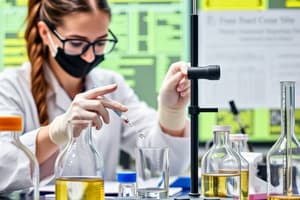Podcast
Questions and Answers
What is the primary component of a scientific investigation?
What is the primary component of a scientific investigation?
- Formulating a hypothesis
- Formulating a specific question or problem (correct)
- Making observations
- Selecting a procedure
What is the purpose of a hypothesis in an experiment?
What is the purpose of a hypothesis in an experiment?
- To provide a tentative answer or solution to the question (correct)
- To prepare the materials needed
- To make observations
- To identify the variables to be controlled
What is the independent variable in an experiment?
What is the independent variable in an experiment?
- The variable that is kept the same in both the experimental and control setups
- The variable that stands alone and cannot be affected by the other variable (correct)
- The variable that is measured
- The variable that depends on the other variable
What is the purpose of a fair test in an experiment?
What is the purpose of a fair test in an experiment?
What is the focus of observation in an experiment?
What is the focus of observation in an experiment?
What is the purpose of choosing appropriate devices and units for measurement in an experiment?
What is the purpose of choosing appropriate devices and units for measurement in an experiment?
What is the purpose of recording and reporting data in an experiment?
What is the purpose of recording and reporting data in an experiment?
What type of graphical representation is used to interpret data in an experiment?
What type of graphical representation is used to interpret data in an experiment?
Flashcards are hidden until you start studying
Study Notes
Scientific Investigation
- A scientific investigation is a systematic approach to answer questions about the world around us.
- The number one component is to formulate a specific question or problem to be tested.
Formulating a Hypothesis
- A hypothesis is a statement that gives a tentative answer or solution to the question.
- It is the expected outcome in an experiment.
Selecting and Justifying a Procedure
- This step involves formulating procedures for the actual experiment.
- Procedure examples:
- Write hypothesis in a testable form.
- Identify the variables that need to be controlled for a fair test.
- Identify the dependent and independent variables.
- Prepare all the materials needed.
- Make experimental and control setup.
Identifying Variables
- Identify the dependent and independent variables in the investigation.
- The independent variable is the variable that stands alone and cannot be affected by the other variable.
- The dependent variable is the variable that depends on the independent variable.
Carrying Out the Procedure
- This step involves performing the experiment, including a fair test.
- A fair test is making sure that in an experiment, one factor or condition (the independent variable) affects another (the dependent variable) by keeping all other conditions constant.
- Control variables are factors that are kept the same in both the experimental and control setups.
Making Observations
- The focus of observation is the dependent variable.
- In this case, the observation is the plant growth.
Making Measurements
- Choose appropriate devices and units for measurement.
- In this experiment, the device is a tape measure or ruler, and the unit is centimeter.
Recording and Reporting
- Record the measurements of plant growth in a certain period of time.
- Use charts or graphs to record and report the data.
Interpreting Data
- Use graphical representation such as bar graphs, line graphs, and pie charts to interpret data.
- Write the interpretation of data in the chosen graph.
Drawing a Conclusion
- Draw a conclusion from the results obtained, including a statement to support or reject the hypothesis.
- The conclusion should be supported by citing studies and experiments with similar results.
Scientific Investigation
- A systematic approach to answer questions about the world around us, with a specific question or problem to be tested.
Formulating a Hypothesis
- A statement that gives a tentative answer or solution to the question, expected outcome in an experiment.
Selecting and Justifying a Procedure
- Formulating procedures for the actual experiment, including:
- Writing hypothesis in a testable form.
- Identifying variables to be controlled for a fair test.
- Identifying dependent and independent variables.
- Preparing materials needed.
- Setting up experimental and control setups.
Identifying Variables
- Identifying dependent and independent variables:
- Independent variable: stands alone and cannot be affected by the other variable.
- Dependent variable: depends on the independent variable.
Carrying Out the Procedure
- Performing the experiment, including a fair test, by:
- Keeping all other conditions constant.
- Identifying control variables: factors kept the same in both experimental and control setups.
Making Observations
- Focusing on the dependent variable, in this case, plant growth.
Making Measurements
- Choosing appropriate devices and units for measurement, such as:
- Tape measure or ruler.
- Units: centimeters.
Recording and Reporting
- Recording measurements of plant growth in a certain period of time, using:
- Charts or graphs.
- Recording and reporting data.
Interpreting Data
- Using graphical representation, such as:
- Bar graphs.
- Line graphs.
- Pie charts.
- Writing interpretation of data in the chosen graph.
Drawing a Conclusion
- Drawing a conclusion from the results, including:
- Statement to support or reject the hypothesis.
- Citing studies and experiments with similar results.
Studying That Suits You
Use AI to generate personalized quizzes and flashcards to suit your learning preferences.




